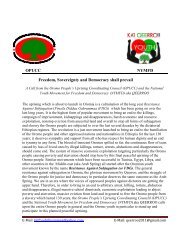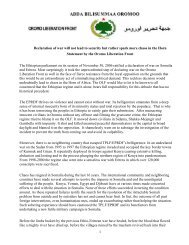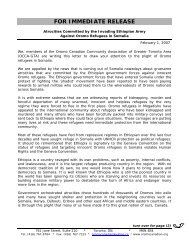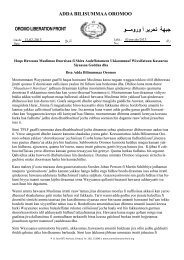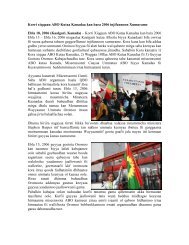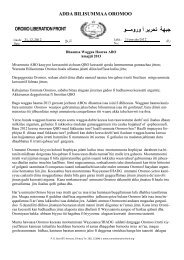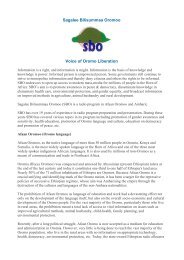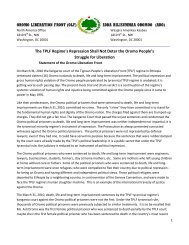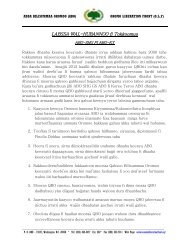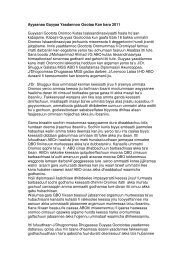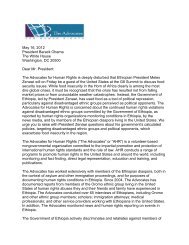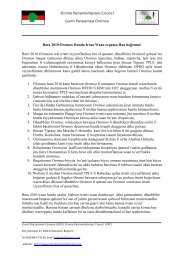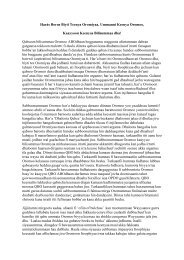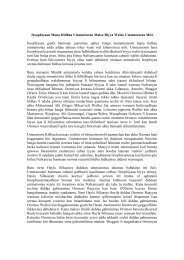May 16, 2012 President Barack Obama The White House - Oromo ...
May 16, 2012 President Barack Obama The White House - Oromo ...
May 16, 2012 President Barack Obama The White House - Oromo ...
You also want an ePaper? Increase the reach of your titles
YUMPU automatically turns print PDFs into web optimized ePapers that Google loves.
<strong>May</strong> <strong>16</strong>, <strong>2012</strong><br />
<strong>President</strong> <strong>Barack</strong> <strong>Obama</strong><br />
<strong>The</strong> <strong>White</strong> <strong>House</strong><br />
Washington, DC 20500<br />
Dear Mr. <strong>President</strong>:<br />
<strong>The</strong> Advocates for Human Rights is deeply disturbed that Ethiopian <strong>President</strong> Meles<br />
Zenawi will on Friday be a guest of the United States at the G8 Summit to discuss food<br />
security issues. While food insecurity in the Horn of Africa clearly is among the most<br />
dire global crises, it must be recognized that this crisis has resulted not from falling<br />
market prices or from unavoidable weather catastrophes. Instead, the Government of<br />
Ethiopia, led by <strong>President</strong> Zenawi, has used food as a tool of political repression,<br />
particularly against disadvantaged ethnic groups perceived as political opponents. <strong>The</strong><br />
Advocates for Human Rights is concerned about the continued human rights violations<br />
against disadvantaged ethnic groups committed by the Government of Ethiopia, as<br />
reported by human rights organizations monitoring conditions in Ethiopia, by the<br />
news media, and by members of the Ethiopian diaspora living in the United States. We<br />
urge you to raise with <strong>President</strong> Zenawi questions about his government’s calculated<br />
policies, targeting disadvantaged ethnic groups and political opponents, which<br />
exacerbate food insecurity in the region.<br />
<strong>The</strong> Advocates for Human Rights (“<strong>The</strong> Advocates” or “AHR”) is a volunteer-based<br />
nongovernmental organization committed to the impartial promotion and protection of<br />
international human rights standards and the rule of law. AHR conducts a range of<br />
programs to promote human rights in the United States and around the world, including<br />
monitoring and fact finding, direct legal representation, education and training, and<br />
publications.<br />
<strong>The</strong> Advocates has worked extensively with members of the Ethiopian diaspora, both in<br />
the context of asylum and other immigration proceedings, and for purposes of<br />
documenting human rights conditions in Ethiopia. Since 2004, <strong>The</strong> Advocates has<br />
documented reports from members of the <strong>Oromo</strong> ethnic group living in the United<br />
States of human rights abuses they and their friends and family have experienced in<br />
Ethiopia. <strong>The</strong> Advocates conducted over 65 interviews of Ethiopians, including <strong>Oromo</strong><br />
and other ethnic group members; scholars; immigration attorneys; medical<br />
professionals; and other service providers working with Ethiopians in the United States.<br />
In addition, <strong>The</strong> Advocates monitored news and human rights reporting on events in<br />
Ethiopia.<br />
<strong>The</strong> Government of Ethiopia actively discriminates and retaliates against members of
disadvantaged ethnic groups as part of its political strategies, violating disadvantaged<br />
ethnic group members’ rights to self-determination, to work and to enjoy just and<br />
favorable conditions of work, to protection and assistance for the family, and to food and<br />
water security.<br />
In practice, the Government of Ethiopia has engaged in extreme violations of the right to<br />
adequate food and housing. <strong>The</strong> deliberate policies of the Government of Ethiopia,<br />
including the recent “villagization” (forced relocation) program, interfere with the rights of<br />
disadvantaged ethnic groups to adequate food and housing. Far from neutral<br />
development programs designed for the betterment of all Ethiopians, these programs<br />
deliberately target populations which the Government of Ethiopia perceives as not<br />
supporting the ruling government of <strong>President</strong> Zenawi.<br />
<strong>The</strong>se practices discriminate especially against disadvantaged ethnic groups. In rural<br />
areas, disadvantaged ethnic groups, particularly pastoralists and groups that practice<br />
shifting cultivation, are being forced to relocate to areas with less desirable agricultural<br />
land. <strong>The</strong> forced relocations impair food and water security. Relocated individuals are<br />
not compensated for the loss of use of their land, and upon relocation these individuals<br />
are not provided with adequate support—including temporary food support and<br />
technical assistance for establishing a new form of livelihood. Moreover, the villages to<br />
which they are relocated often lack basic infrastructure, including health clinics, clean<br />
water supplies, and schools.<br />
This program appears designed to accommodate domestic and foreign corporations<br />
seeking to establish commercial, export-oriented agri-business operations in those rural<br />
areas. Contracts with the commercial agri-business entities impose few if any<br />
restrictions on water usage, heightening food insecurity for individuals relocated to<br />
agricultural lands located downstream.<br />
In Gambella and Benishangul, respectively, 45,000 and 90,000 households are slated<br />
for relocation due to villagization and land investment displacements, resulting in a loss<br />
of livelihood for over 650,000 people. <strong>The</strong> total number of people affected is estimated<br />
to exceed one million considering those affected by villagization or land investment in<br />
SNNPR, Oromia, Afar, and other regions.” <strong>Oromo</strong>s reported being relocated from fertile<br />
to infertile areas.<br />
In addition to the villigization program, the Government of Ethiopia routinely violates the<br />
right to adequate food and housing by systematically and insidiously discriminating<br />
against disadvantaged ethnic groups and people supporting opposition political parties.<br />
<strong>The</strong> Government of Ethiopian uses rural administrative councils to control local<br />
communities. <strong>The</strong>se councils, typically under the control of the ruling party, control<br />
access to food assistance and other state distributed resources. In areas populated by<br />
disadvantaged ethnic groups perceived not to support the ruling party, these councils<br />
use this access to coerce allegiance to the ruling party and to punish dissent.<br />
<strong>The</strong> United Nations Committee on Economic, Social and Cultural Rights recognized that
“[p]olitical and other opinions are often grounds for discriminatory treatment and include<br />
both the holding and not-holding of opinions . . . . Access to food assistance schemes,<br />
for example, must not be made conditional on an expression of allegiance to a particular<br />
party.” Human Rights Watch reports that kebeles, which are rural villages or<br />
neighborhoods usually containing several hundred households and make up 85 percent<br />
of Ethiopia’s population, are administered by councils and officials from the EPRDF<br />
party that exert crucial control over rural communities. Human Rights Watch reports that<br />
kebele officials “determine eligibility for food assistance, recommend referrals to<br />
secondary health care and schools, and help provide access to state-distributed<br />
resources such as seeds, fertilizers, credit, and other essential agricultural inputs.”<br />
<strong>The</strong> government of Ethiopia, led by <strong>President</strong> Zenawi, has continually engaged in<br />
human rights violations against Ethiopia’s disadvantaged ethnic groups. Its politically<br />
motivated programs and policies create and exacerbate food insecurity for hundreds of<br />
thousands of disadvantaged ethnic groups. Again, we urge you to raise with <strong>President</strong><br />
Zenawi questions about his government’s calculated policies, targeting disadvantaged<br />
ethnic groups and political opponents, which exacerbate food insecurity in the region.<br />
Sincerely,<br />
Robin Phillips<br />
Executive Director



